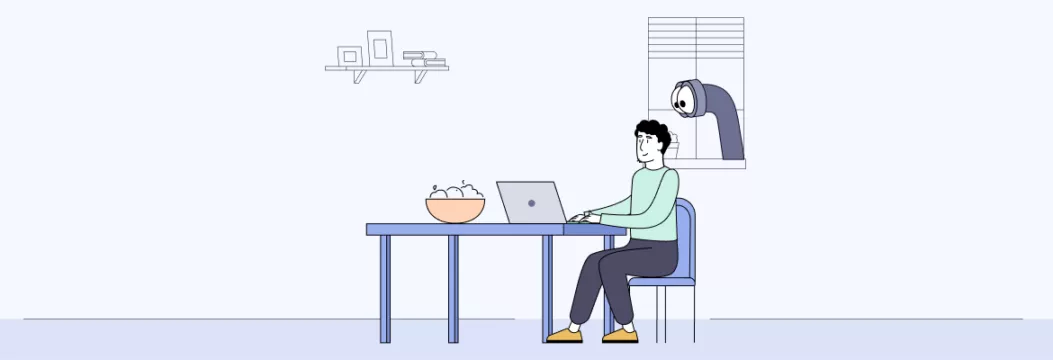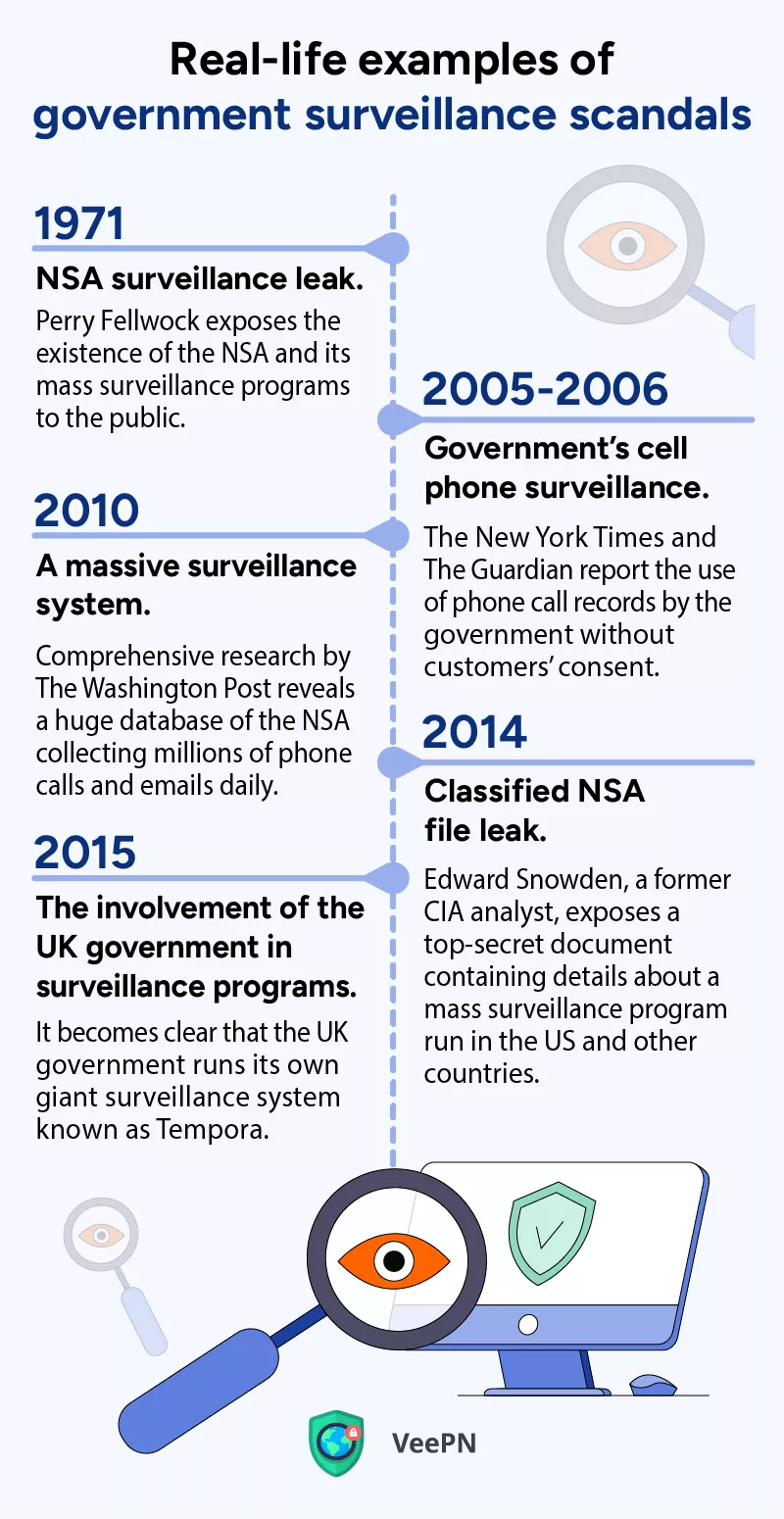Is the Government Watching Me? (Yes! Find Out How to Protect Your Privacy)
Most likely, you’re using several gadgets, multiple social media platforms, and other digital services (including AI-based ones) that make our lives easier and more exciting. But at some point, you may realize that all those goodies have a shady side – they may actually help authorities collect information about you or even spy on you directly. And here comes the question – is the government watching you, really? If you’re here for a short answer, then yes, the government is watching you. But the question is, how much can they learn under frameworks like the Foreign Intelligence Surveillance Act, which governs some of this activity? Keep reading to find out.

Why does the government spy on us?
OK, first things first. If you’re not a foreign spy and don’t participate in any illegal activities, why would the government watch you?
To answer this question, let’s define government surveillance and explain the most common reasons why authorities may spy on Internet users.
What is government surveillance?
Government surveillance is the collection of personal information about individuals or groups of people. It’s usually performed by specific authorities, such as the National Security Agency (NSA), the Central Intelligence Agency (CIA), and the Federal Bureau of Investigation (FBI). Massive surveillance is common in many regions worldwide, including Western democracies like the US, Canada, the UK, and the EU countries (often coordinated by intelligence agencies like the NSA, CIA, and their foreign counterparts).
Governments use various methods and technologies to monitor Internet communications and keep tabs on digital behavior. for a couple of reasons. Let’s consider the most widespread ones.
Main reasons for government surveillance
- To prevent crime and terrorism. For most authorities that collect massive amounts of data about users, such as the NSA and CIA, mass surveillance is justified for national security purposes, including the prevention of terrorism and other national threats. But in many cases, governments go even further, making people concerned about their digital privacy. According to a Pew Research survey, 66% of Americans believe that the government collects too much data about their online activities.
- To control online behavior and apply censorship. Most critics of government surveillance agree that the authorities gather information about Internet users without a fair reason. Moreover, they potentially collect this data without users’ consent, violating their rights. Moreover, they might gather this information without getting users’ permission which breaks their rights. In some places, oversight of the Internet is now a standard part of their laws. Because of this, governments in China, North Korea, Iran, UAE, Russia and similar regions have put harsh online censorship into place.
Conspiracy theories aside, there are numerous cases when the government crossed the line, resulting in surveillance scandals that shook the world. Let’s take a look at the most well-known examples.
Real-life examples of government surveillance
Here are a couple of famous cases of government surveillance being revealed to the public.

⚡ NSA surveillance leak, 1971. Perry Fellwock, a former NSA analyst, was the very first whistleblower to reveal the existence of the NSA and its global surveillance activities to the world. He gave an extensive interview to Ramparts magazine, shedding some light on potentially illegal spying on American citizens by the US government. But at that time, few people actually believed him.
⚡ Government cell phone surveillance, 2005-2006. The New York Times and The Guardian reported that George W. Bush’s administration was collecting phone records of Verizon, AT&T, and BellSouth customers without court decisions. One of the main reasons was the attempt to track numbers linked to Al-Qaeda.
⚡ A growing surveillance system, 2010. The Washington Post reported that the NSA and other American government organizations (including private contractors and government agencies) were collecting nearly 1.7 million emails and phone calls every day. Moreover, the databases grew so big that the authorities could barely handle them.
⚡ Classified NSA file exposure, 2014. Perhaps, the most famous government surveillance scandal broke when Edward Snowden, a former CIA analyst, leaked details of the NSA warrantless surveillance program to the public. The file contained information about the actual scope of the agency’s surveillance program. In particular, according to this document, NSA collected approximately 20 terabytes of customer metadata every minute. It included information from Google, Facebook, Apple, and other tech giants. The operational details were also related to Five Eyes alliance members and other partners of the US government.
⚡ The UK government involved in the NSA surveillance program, 2015. Snowden’s leak was related not only to the US authorities, but also to the governments of other countries. It became clear that the Communication Headquarters of the UK government (GCHQ) cooperated with the NSA in their programs. They ran Tempora – a giant surveillance system – to collect and process massive amounts of information.
Now you’re familiar with the real background of government surveillance activities. So let’s take a closer look at the data the authorities collect about Internet users and figure out how they can use this information.
What does the government learn from your metadata?
Metadata refers to small pieces of information associated with all your digital activities (the files you share, messages you send, Google requests, emails, phone calls, and so on). In general, it doesn’t tell much about you. But when collected regularly and systematically, it can help authorities develop patterns, analyze them, and create a scaringly accurate profile of your online behavior.
To be more specific, here’s what government collection of digital metadata can expose about you:
- Your most frequently visited locations
- Your main interests and preferences
- Your relationships with other people
- The frequency and duration of your calls
- Your preferred communication channels (like email services, messaging apps, and social media platforms).
Unfortunately, it’s just the tip of the iceberg. Considering that most aspects of over lives go digital (and with the rise of AI in mind, of course), we can assume that the government will be able to learn much more in the years to come.
But for now, let’s look at the most common methods authorities are already using to collect data about us.
How does the government watch you?
Here are the most typical methods and techniques the government can use to gather and analyze information about your online activities (spoiler: most of them are related to artificial intelligence and social media).
AI-based mass surveillance
Since your Instagram, TikTok, Facebook, X (Twitter), and other social media profiles are open to the public, there’s nothing illegal in collecting your info from there. But the most interesting (or rather disturbing) part is how government officials process and analyze this data.
According to several studies (including the ones based on the files leaked by Snowden), experts agree that the government uses powerful AI-based tools to analyze metadata collected from social media. Such mass surveillance programs involve advanced software that helps the officials make assumptions regarding the following aspects of your digital life:
- Your relationships with other social media users
- The meaning of your social media posts’ content
- Your past and current locations
- Your gender, religion, sexual orientation, political views, and more.
Social media and face recognition
Among all the methods of monitoring users on social media, facial recognition technology is one of the most sophisticated (and also concerning) techniques. AI tools can analyze the photos you share on social networks like Meta (Facebook) and Instagram to help the police and other authorities recognize people’s faces.
In particular, the American police used facial recognition in 2021 for their criminal investigation. The same technology was also used by the Australian government in order to control the execution of the rules related to the COVID-19 pandemic.
Tech giants
Of course, big corporations like Google, Meta, and Apple know a lot about us. In fact, they probably collect even more data than the government itself! Their goal is different, though – most often, tech giants do it for marketing purposes.
But there’s another problem here – data collection by companies can be shared when the government requests it. And, since any digital platform is supposed to comply with local laws, they will likely do it (not always, of course – in fact, Google explained their approach to sharing customer information when requested by the government back in 2013).
Internet service providers
Another potential intermediary between your online activities and government surveillance is your Internet service provider (ISP). The requests from authorities to Internet providers like Verizon and AT&T are also quite frequent. So, apart from selling your personal information to make money, an ISP can give it out to the police or FBI.
Now, how much does your ISP know about you? Well, it’s pretty much everything, including your browsing history, Google searches, and even messages you send and receive (read our recent blog post on this topic to find out details).
Legit surveillance
Finally, the government can come up with specific laws and regulations allowing them to run completely legal surveillance programs without even hiding. But this is very unlikely to take place in democratic countries applying strict digital privacy rules (such as GDPR in the European Union countries and CCPA in the US). But if you live in a country with a strict authoritarian or totalitarian government, it could be the case.
Now that you know how the government may spy on you exactly, you probably wonder if there’s anything you can do to keep your data to yourself. Luckily, there are a couple of ways to strengthen your digital privacy and prevent unwanted monitoring.
How to avoid unwanted government surveillance
Here are the most effective ways to prevent the government from watching you online and collecting massive amounts of data related to your Internet activities.
Don’t overshare your personal information on social media
Remember that powerful AI able to collect and analyze metadata based on your social media activity? Well, if you didn’t have your profile on Facebook, Instagram, and LinkedIn, there would be no data to process. But if removing all your social media accounts is a too drastic move for you, do your best to keep your sensitive information to yourself. Avoid posting anything potentially sensitive on your social media (this applies to the texts, photos, and videos you share).
Don’t communicate sensitive data online
If you live in a country with strict government censorship (check out the list of regions with a low level of Internet freedom here), unencrypted channels to transmit data online through the Internet. And, in case you’re a journalist, human rights activist, or whistleblower, make sure to use secure and encrypted communication channels. Otherwise, your personal information may be tracked by the government, leading to potential legal issues.
Stay away from shady apps and links
Unverified third-party applications may appear to contain malware or spyware aimed at stealing your personal details. And those standing behind such shady programs are often related to the government. If you happen to install such an app on your device, it may even let somebody gain access to your system without your knowledge.
Another crucial security measure is to stay away from suspicious links hidden in legit-looking ads, emails, and website banners. But once you click on such a link, it will take you to a malicious website striving to compromise your privacy (learn more tips on avoiding phishing attacks here).
Use a password manager tool
While the government can use the same technologies as hackers to crack your passwords and access your personal info, it will be much more difficult if you store them in a secure place. That’s why it’s highly recommended to use a reliable password manager tool, such as LastPass, MacPass, or Keeper. With its help, you can not only keep your credentials away from prying eyes, but also create strong and unique passwords for all your accounts.
Try a VPN
If you’re concerned that the government and other third parties might be watching you, a virtual private network (VPN) is a must-have tool in your digital security kit. It hides your real IP address, making all your Internet traffic travel through a specific encrypted tunnel. This way, all your data is transformed into unreadable text. So even if a snooper manages to access it, they won’t be able to decipher your messages, emails, and search queries.
On top of that, a powerful VPN service like VeePN offers a bunch of important online privacy and security perks, including the following ones:
- NetGuard is a strong anti-monitoring solution that spots potential threats, blocks unwanted pop-ups, and detects infected websites.
- Kill Switch interrupts your Internet connection when your VPN is down to avoid potential leaks.
- IP and DNS leak protection prevents the unwanted exposure of your connection details.
- Double VPN allows you to reroute your traffic through two remote VPN servers instead of one for ultimate privacy.
- Antivirus lets you scan your Windows and Android devices to detect potential viruses, malicious programs, and malware.
VeePN is a reputable VPN service provider that follows a strict No Logs policy. It means that we don’t collect, process, or sell your private data to any third parties, be it a marketing agency or a government authority.
Disclaimer: VeePN is a VPN service not intended to be used for conducting any illegal acts. Please remember to check whether there are any restrictions in your particular country before doing anything potentially questionable. Please be informed that if some action is illegal without using a VPN, it will also be illegal with its use.
Check out VeePN’s pricing plans and try if it works for you with a convenient 30-day money-back guarantee!
FAQ
Although it’s not a common practice, government authorities might be watching you through your phone. But for that, they need to introduce a specific type of surveillance program, such as malware or spyware, on your device. To avoid that, it’s worth using a reliable antivirus tool, such as VeePN’s Antivirus. Read this article to learn more.
Yes, the government monitors Internet users and collects massive amounts of information about that. Many government authorities, such as the NSA, the CIA, and the FBI, run specific programs using artificial intelligence to analyze social media accounts and collect users’ metadata. Check out this article for more details.
There are several warning signs regarding the potential government surveillance:
- Specific echoes or noises during phone calls could mean that somebody else is listening to your conversations.
- Strange technical problems and unusual behavior of your apps might be a sign of spyware introduced to your device.
- If somebody else gets unauthorized access to your accounts, they may attempt monitoring communications, browsing history, and other online behavior.
Like other government organizations, the CIA tends to run mass surveillance programs. Mostly, they collect, process, and analyze tons of data users expose on their social media. One famous example of such a program is the file leaked by Edward Snowden in 2014. Check out this article to learn more.
The government might watch Internet users due to the following reasons:
- To prevent terrorist acts and other criminal activities
- To run mass surveillance programs and collect information about people (including their locations, relationships, interests, and more)
Read this article for more information.
The NSA runs many programs aimed at gathering and analyzing information about people. Usually, they collect data exposed on electronic sources, including phone call records, emails, videos, text messages, and metadata based on social media activities. Read this article to learn details about government surveillance.
VeePN is freedom
Download VeePN Client for All Platforms
Enjoy a smooth VPN experience anywhere, anytime. No matter the device you have — phone or laptop, tablet or router — VeePN’s next-gen data protection and ultra-fast speeds will cover all of them.
Download for PC Download for Mac IOS and Android App
IOS and Android App
Want secure browsing while reading this?
See the difference for yourself - Try VeePN PRO for 3-days for $1, no risk, no pressure.
Start My $1 TrialThen VeePN PRO 1-year plan







